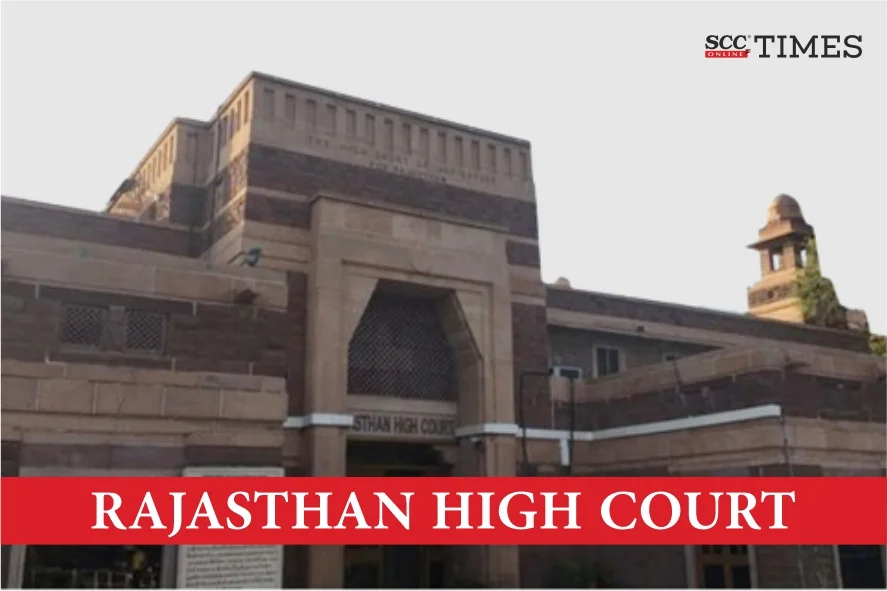Rajasthan High Court: In a bunch of writ petitions seeking issuance of writ of mandamus against the respondents for declaration of the respondent’s action, attempt to demolish the petitioners’ properties for the purpose of widening the road without following the due process of law, as being illegal, arbitrary, unjust, non-consensual and against the law and in violation of Articles 14, 21 and 300-A of the Constitution of India and also against the principles of natural justice, a single-judge bench of Anoop Kumar Dhand, J., while not stalling the road widening and beautification projects as per Master Plan, issued directives striking a balance between development and environmental protection and observed that the principle of inter-generational equity must guide such projects. The Court further directed the respondents to plant ‘10 trees for every one fell’.
“…the number of trees planted as a compensatory measure shall be ten times the number of trees cut for the purpose of carrying out any development work.”
In the instant matter, a large number of petitioners, residents and property holders in Kotputli, Jaipur, filed writ petitions under Article 226 of the Constitution of India challenging the action of the Municipal Council and the State of Rajasthan for conducting a demolition drive and cutting trees for road widening and beautification without serving notices or following due legal procedures.
The petitioners asserted ownership or lawful possession through registered sale deeds, pattas from erstwhile princely states (Riyasat of Khetri), and documents issued by local authorities. They claimed that the demolition of their properties and removal of trees was done arbitrarily, without notice or hearing, violating their fundamental rights under Articles 14, 21, and 300-A of the Constitution of India. The common grievance was that the action was high-handed and unjust, carried out in disregard of established principles of natural justice and statutory protections under the Right to Fair Compensation and Transparency in Land Acquisition, Rehabilitation and Resettlement Act, 2013 (‘the Land Acquisition Act’).
However, the respondents justified the demolition drive as part of public infrastructure development. It was contended that the work was necessitated due to increasing traffic and public need, many structures were encroachments on public land and the development works were carried out in public interest. It was further contended that due process was followed, and notices were allegedly issued.
On demolition drive carried on by respondents without notice, the Court reaffirmed that “the State cannot deprive citizens of their property without following the due process of law” and emphasised on Article 300-A of the Constitution and the principle of “procedural due process.”
The Court cited State of Haryana v. Mukesh Kumar, (2011) 10 SCC 404 and noted that “right to property is now considered to be a human right, which includes right to shelter.” The Court also referred to Jagpal Singh v. State of Punjab, (2011) 11 SCC 396, and emphasised that eviction of unauthorized occupants must follow due process, including notice and hearing.
The Court found the respondents’ actions to be violative of the principles of natural justice. The Court held that “demolition of property without providing any opportunity of hearing is arbitrary and impermissible.” The Court reiterated that even unauthorized occupants are entitled to notice before action is taken.
“City’s development and beautification efforts, as outlined in the Master Plan, should proceed without obstruction. However, it is equally essential to ensure that property owners whose assets are subject to demolition are given a fair hearing.”
Expressing concern over indiscriminate cutting of trees, the Court asserted that “there cannot be beautification by making the environment ugly.” The Court emphasised on the importance of a sustainable environment and declared that for every tree felled during development works, ten trees must be planted in compensation.
“Planting trees and plants, as directed above, is an initiative that this Court considers appropriate, as thriving trees, whether for decades or centuries, provide continuous and silent benefits to the city and its surrounding community. Future generations will enjoy a cleaner, fresher, and oxygen-rich environment as a result thereof.”
On compensation and future action, the Court directed that where properties were demolished without notice, the State must —
- Either reconstruct the same at its cost or pay compensation;
- Undertake fresh demarcation before further demolition;
- Issue notices to all affected parties with adequate opportunity of representation;
-
Not proceed without complying with the Land Acquisition Act where applicable.
The Court disposed of the petitions with the following directions —
- Directed the respondents to form a committee within 15 days. Petitioners must submit representations and documents concerning their ownership or tenancy claims within the next 15 days.
- The Committee must provide a fair hearing and issue reasoned, speaking orders in each case.
- If any petitioner is found to have a valid title, and the land is needed for public works, adequate compensation shall be paid based on prevailing DLC rates or alternative land allotted under applicable schemes.
- If no objections are filed, the respondents may proceed as per the law.
- Aggrieved parties may approach the appropriate legal forum for redressal.
- Directed the respondents to plant ‘10 trees for every one fell’ in the close vicinity and nearby public area,” and a report must be filed with the Court.
-
All proceedings were directed to be completed within a period of three months.
[Gyanchand Soni v. State of Rajasthan, 2025 SCC OnLine Raj 2605, Decided on 26-05-2025]
Advocates who appeared in this case:
Mr. Ashish Sharma, Mr. Mukul Sharma, Ms. Lipi Garg, Mr. Sidharth Bapna, Mr. Hemant Sharma, Mr. Ajay Gupta with Ms. Sampti Sharma, Mr. Pramod Kumar Bansal, Mr. Ranvijay Singh, Mr. Jitendra Mitrucka, Mr. Harshit Sharma, Mr. Mishra Naveen Chandra and M. Mukesh Kr. Meena, Counsel for the Petitioners
Mr. G.S. Gill-AAG, Mr. S.P.S. Rajawat- Asstt.G.C., Mr. Manoj Kumar and Ms. Anima Jain, Counsel for the Respondents


